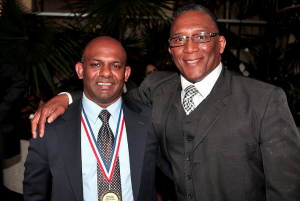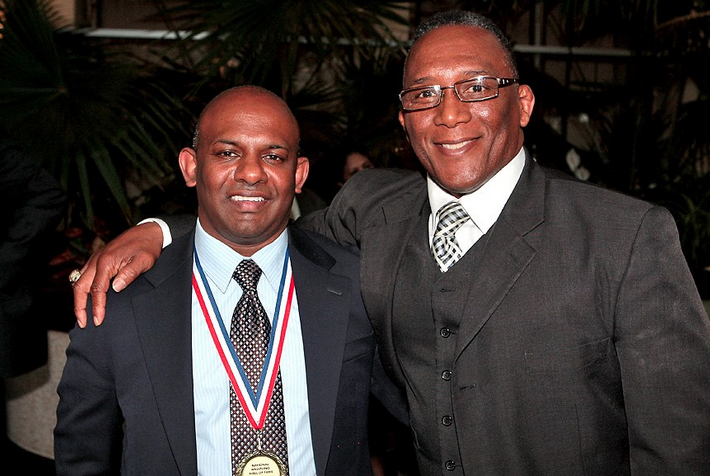
In the Sachem Central School District there is this special correlation between alumni and coaches in all walks of athletic life. There is a cyclical approach to careers and lives that involve performing for the Flaming Arrows, graduating and moving on to the next level with a robust foundation of developmental skills found only in top tier high schools, and eventually working hard to come back in the Sachem fold as a teacher and coach. Hundreds upon hundreds of Sachem alumni have completed the cycle.
The deciding factor for many is the intrinsic gains these athletes make under legendary and father-like coaches. You’ll hear names like Jack Mahoney, Fred Fusaro, Risa Zander and Ken Freidheim thrown around with great respect in Sachem, on Long Island and around the nation. They are pillars in their respective sports. Isaac Ramaswamy will be spoken about in the same fashion.
For his efforts as an athlete, and a coach of wrestlers across the world at various levels, and years of dedication to the development of leadership and citizenship in youth through the sport of wrestling, “Swamy” is being inducted to the New York State Chapter of the National Wrestling Hall of Fame in 2014 for his Lifetime Service to Wrestling.
Swamy joins Coach Mahoney (2005) as the only other member of the Sachem family to gain induction to this prestigious group. Humble as he may be, Swamy’s wrestling resume boasts itself. With decades of high-level competition under his belt and a world’s encyclopedia worth of international, national and local coaching to his credit, he packs a heavy punch on the mat.
“I’m being recognized for a multitude of things,” he said. “My athletic accomplishments are one thing. I got to a point in my career that I’m very proud of. I’m getting in not for my athletic accomplishments, but because I remain in the sport, continue to coach and teach and to be an advocate for the sport. It feels good. It’s nice to be recognized for doing something you care about.
“Wrestling I credit for giving me the qualities I have as a human being. When I was still competing I said I really want to be a teacher and a coach. When people stop competing they get a sense of being lost, they don’t know what the next hurdle is. Some of these guys don’t even have an idea of what their career path is going to be. For me it was always pretty clear.”
From the time Swamy was on Sachem’s varsity wrestling team in the 1980s, Mahoney could tell he had the hunt and know-how to strive for the next level, to set goals and accomplish those goals systematically.
“He came through the program as a hard working light weight and really loved the sport,” Mahoney said. “ He showed he would sacrifice anything and would do anything to get better and better.”
For athletes like Swamy, having the drive and motivation, coupled with the guidance of men like Mahoney and Fusaro, it was the perfect storm to catapult him in a lifetime of strong competition and coaching.
“They are a cut above the rest,” Swamy said. “Those hall of fame coaches really set the bar for what we as kids aspired to be as athletes and eventually coaches. That’s why you see so many guys come back to coach at Sachem.”
Enter another legendary coaching figure in Joe DeMeo. Swamy attended the University of Albany and matured into a world-class athlete during his time on the college mat. DeMeo is renowned for his expertise in the Olympic style of wrestling.
“We had high school coaches who had expectations of what was in their world and I got to Joe DeMeo and he took it to another level,” said Swamy. “He told me about competing overseas and how to make an Olympic team.”
He couldn’t look five feet in the room without seeing Olympians and national champions. The atmosphere was ripe for the taking. You had Shawn Sheldon, who placed fourth at the ’92 Olympics, Andy Seras, who competed at the ’88 Olympics, Jeff Blatnick, a Gold Medalist at the ’84 Olympics, and dozens of other big names.
“To be in a room with guys like that was what helped make the transition believable,” he said. “If I’m in there practicing with these guys everyday, and they’re competing for the Olympic team, why can’t I? When you walk into a room with world class athletes you have to fit in.”
Soon enough, Swamy eventually become that world-class athlete. His athletic career skyrocketed in the 1990s. Aside from placing high in dozens of national and international competitions from 1989 through 1996, Swamy was a two-time U.S. National Champion in 1994 and 1995, placed second at the World Team Trials in 1993, 1994 and 1995, second at the 1994 Pan American Championships, won the 1987 Espoir Nationals, placed third at the 1992 U.S. Olympic Team Trials, was an Eastern Greco Champion in 1994 and 1995, and an East Regional Olympic Trials Champion in 1996.
One of his highest achievements was placing second at the U.S. Olympic Team Trials in 1996 and serving as an alternate for the U.S. Olympic Team.
Following his wrestling career, he immediately went into coaching. He has been an assistant coach in Sachem since 1996, first at Sachem High School North until 2004, and then at Sachem High School East until present day.
He coached Junior National Teams from 1992-2011, becoming the head coach in 1998, and has coached three Junior World Teams (2007 China, 2003 Turkey and 2001 Poland).
At Sachem East he has been a three-time League Assistant Coach of the Year, and was named 2013 Section XI Assistant Coach of the Year after helping lead the Arrows to their first Suffolk team title since the Sachem Schools reconfigured in 2004 creating the newer high school. Sachem East, under the guidance of head coach Sean O’Hara and Swamy, has had four top five finishes in Section XI, a record of 136-43 (as of 2013), and has never had a losing season.
O’Hara, who graduated from Sachem in 1992 and wrestled at the University of Pennsylvania, grew up watching Swamy on the mat in what is now known as the Jack Mahoney Wrestling Room at Sachem High School North in Lake Ronkonkoma, N.Y. He recalls their first season together nine years ago at East and saw his friend and assistant’s strengths come through.
“During that first season I was really focused on winning, Isaac was quick to teach me that it was more important that we do things the right way,” O’Hara said. “That our job was instilling good values in our wrestlers such as discipline, character, and work ethic. That was just one of the lessons I have learned from Swamy, and that approach has become the cornerstone of our program’s philosophy.”
That philosophy has accrued over time. It started at Sachem, grew at Albany, blossomed on the national and world stage and continues to expand from the wrestling rooms at Sachem.
“It’s been a lifetime commitment to the sport,” Mahoney added. “He’s everything this part of the hall stands for.”
-Words by Chris R. Vaccaro
